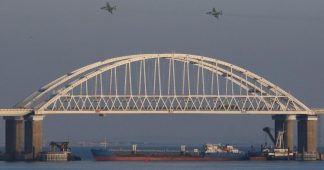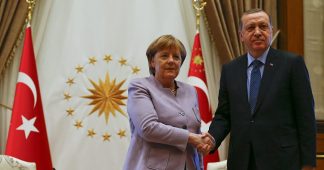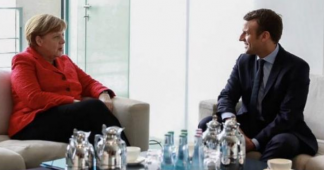By
Germany is considering a break from decades of military non-confrontation.
High ranking officials are contemplating sending a warship through the Taiwan Strait — joining the United States and France in challenging Beijing’s claims to what the West regards as an international waterway.
If Chancellor Angela Merkel’s government actually goes ahead, it will be a remarkable revision of its we-keep-out-of-conflict reflexes. Germany will be openly backing its allies in a strategy certain to be found provocative by the country’s enforcers of non-combatant passivity.
Recent examples of Germany’s reluctance to engage include the withdrawal of its navy from the combat zone during the West’s Libyan intervention in 2011, caveats on its troop deployments in Afghanistan, and its decision not to participate directly in attacks on Islamic State forces in Syria — unlike its NATO neighbors Belgium, the Netherlands, Denmark and France.
A German official informed me of the Taiwan Strait plan last month. Last week, a second German official, at my request, confirmed its discussion by the defense ministry. No firm decision was expected before the end of the summer.
The strait in question is the body of water between China and Taiwan, which Beijing considers to be its territorial zone. When a French frigate transited in April, it was shadowed by Chinese military and warned to leave. Beijing said it made “stern representations” to Paris about the vessel’s “illegal” passage.
Later that month, the United States sent two destroyers into the strait “demonstrating the U.S.’s commitment to a free and open Indo-Pacific,” according to an American spokesman.
The U.S. has prioritized countering China’s military rise since the early days of Barack Obama’s presidency. France, for its part, has seized every possibility to underscore its identity as a global, nuclear-armed interventionist and potential American wingman.
Why would Germany get involved? Some elements in Merkel’s government see a double opportunity, given Berlin’s lousy relations with U.S. President Donald Trump and wide disrespect elsewhere for its hide-under-the-bed routine.
It certainly wouldn’t hurt to back up the U.S. at a time when Washington has suspended threats of tariffs for six months on imported German cars. The naval mission would also be an opportunity to show up France, which likes to portray itself as the European Union’s sole functional military power and which has responded to Merkel’s opposition to most of President Emmanuel Macron’s reform proposals for the EU by becoming one of Germany’s sharpest critics.
France has just spent two years and €1.3 billion to refurbish its atomic-powered carrier, the Charles de Gaulle. French generals have accused Berlin of running a “non-combat” army. Macron himself has said that Germany’s growth model, based on profiting from imbalances in the eurozone, is at an end.
His openness has emboldened French commentators to pick up the now authorized lash. Zaki Laidi, a professor at Sciences Po, the French political science university, wrote last month that Merkel ‘’has done absolutely nothing’’ to change Germany’s role as a rich global bystander protected by America.
The question now is whether the government, faced with deepening political weakness at home, will challenge that portrayal and actually follow through with the plan for projecting power.
The signs aren’t overwhelmingly promising. Merkel’s apparent valedictory speech at the Harvard University commencement a week ago was a time warp moment — a pretend flashback to a time when Germany was the uncontested European leader, bathing in cash, moderation and the overdrawn favor of Obama.
In reality, Germany is politically riven to the edge of instability. Its economic prospects are dim. Merkel’s paralytic coalition with the Social Democrats has “cave-in” scrawled all over it two years before she is scheduled to leave office in 2021.
Polls over the weekend measured the depth of Germany’s cracks. For the first time since the Green Party became a player in the early 1980s, the environmentalist movement surpassed Merkel’s Christian Democrats in a projection of national election results. The Social Democrats sank to a historical low, just a point ahead of the far-right Alternative for Germany.
Economically, what Merkel once called Germany’s “Beacon to the World” keeps flashing dimmer shades of yellow. The German Chamber of Commerce and Industry reports that gross domestic product growth will fall to 0.6 percent this year, with little prospect for improvement in 2020.
Worse still: The chancellor’s chosen successor, CDU party leader Annegret Kramp-Karrenbauer, is failing in her job preparation. A poll last week showed that 70 percent of the Germans think she is not up to the task.
Among her ideas: a “symbolic project’’ for Germany and France to jointly build an aircraft carrier to demonstrate the EU’s role as a ‘’security and peace power’’ — without detailing its mission. Forced to deal with her protégé’s fantasy, while refusing herself to meet NATO’s spending targets, Merkel has been cornered into saying ‘’it’s right and good.’’
In this context, launching a naval in-your-face operation off the coast of Taiwan would constitute a groundbreaking but unfamiliar act of valor.
Admirably, there are German officials who want to combat the notion that the country is an irresponsible and non-committal ally. More power to them. The place to do that is the international waters of the Taiwan Strait. Now, the German navy needs to get that far.
* John Vinocur was executive editor and vice president of the International Herald Tribune.
Published at https://www.politico.eu/article/germanys-military-maneuvers/











